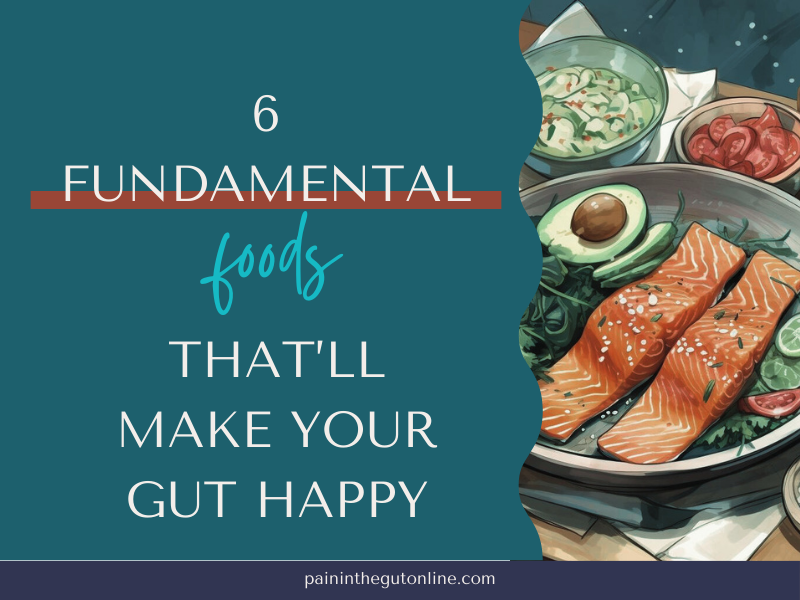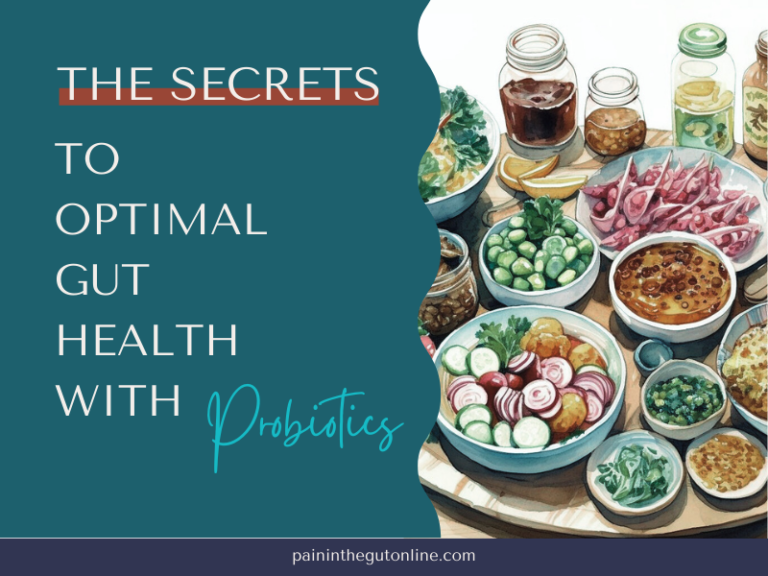GUT HAPPY
10 min read/ 2332 words
Improve your gut health with these gut happy foods! Say goodbye to digestive issues and embrace a healthier you.

Table of Contents
Understanding Gut Health
To address chronic digestive issues and improve your overall well-being, it’s essential to understand the importance of gut health and how it can be influenced by the foods you consume.
The Importance of Gut Health
Your gut plays a vital role in your overall health and well-being.
It is responsible for the digestion and absorption of nutrients from the foods you eat, as well as the elimination of waste products.
Additionally, the gut houses trillions of microorganisms, collectively known as the gut microbiota, which play a crucial role in various aspects of health, including immune function and mental well-being.
Maintaining a healthy gut is important for optimal digestion, nutrient absorption, and a strong immune system. A happy gut can also positively affect your mental health and weight management.
Research suggests that an imbalance in the gut microbiota may be linked to various health conditions, including irritable bowel syndrome (IBS), inflammatory bowel diseases (IBD), and even mental health disorders.
Common Digestive Issues
Digestive issues are widespread and can significantly impact daily life.
Common digestive issues include bloating, constipation, diarrhea, acid reflux, and abdominal pain. These issues can be caused by various factors, such as poor diet, stress, medication use, and underlying health conditions.
If you’re experiencing chronic digestive issues, it’s important to consult with a healthcare professional to determine the underlying causes and develop an appropriate treatment plan.
Making dietary and lifestyle changes can be beneficial in improving gut health and alleviating digestive discomfort.
How Food Impacts Gut Health
The foods you eat have a direct impact on your gut health.
A balanced and nutritious diet that includes foods rich in fiber, probiotics, and prebiotics can promote healthy gut microbiota and support proper digestive function.
- Fiber: Eating the right amount of fiber is crucial for gut health. Fiber acts as a prebiotic, nourishing the beneficial bacteria in your gut. It helps regulate bowel movements, prevents constipation, and supports growing diverse gut bacteria. Fiber-rich foods include whole grains, legumes, fruits, and vegetables.
- Probiotics: Probiotics are beneficial bacteria that can help maintain a healthy gut microbiota. They can be found in fermented foods like yogurt, kefir, sauerkraut, and kimchi. Probiotic supplements are also available, but it’s important to choose high-quality products that are backed by scientific evidence. For more information on gut health supplements, check out our article on gut health supplements.
- Prebiotics: Prebiotics are fiber that cannot be digested by your body but serve as food for the beneficial bacteria in your gut. They help stimulate the growth and activity of these bacteria. Prebiotics-rich foods include garlic, onions, leeks, asparagus, and bananas.
Incorporating gut-healthy foods into your diet can support healthy gut microbiota and improve your digestive health.
In the following sections, we will explore specific foods that can help improve gut health, as well as provide meal planning tips and recipe ideas for incorporating these foods into your daily routine.
Key Nutrients to Make Your Gut Happy
Improving your gut health starts with nourishing your body with the right nutrients.
There are three key nutrients that play a significant role in supporting a healthy gut: fiber, probiotics, and prebiotics.
1. Fiber
Fiber is an essential nutrient for maintaining a healthy digestive system.
It promotes regular bowel movements and helps prevent constipation. Additionally, fiber acts as a prebiotic, nourishing the beneficial bacteria in your gut.
Including a variety of high-fiber foods in your diet is crucial for optimal gut health. Some excellent sources of dietary fiber include:
| Food | Fiber Content (per 100g) |
| Chia Seeds | 34.4 g |
| Lentils | 7.9 g |
| Avocado | 6.7 g |
| Broccoli | 2.6 g |
| Whole Grain Bread | 2.1 g |
2. Prebiotics
Prebiotics are dietary fiber that serve as food for the beneficial bacteria in your gut.
They help stimulate the growth and activity of these beneficial bacteria, promoting a healthy gut microbiome.
Including prebiotic-rich foods in your diet can support the growth of beneficial bacteria. Some examples of prebiotic foods include:
| Food | Prebiotic Content |
| Garlic | inulin |
| Onion | fructooligosaccharides |
| Asparagus | inulin |
| Bananas | resistant starch |
| Oats | beta-glucan |
Incorporating these prebiotic-rich foods into your meals can help nourish the beneficial bacteria in your gut. For more information on the gut health benefits of prebiotics, check out our article on gut health and prebiotics.
Foods to Improve Gut Health
Improving your gut health starts with making conscious choices about the foods you consume. You can support a healthy gut and alleviate digestive issues by incorporating specific foods into your diet.
Three key types of foods to focus on are whole grains, fermented foods, and fruits and vegetables.
3. Whole Grains
Whole grains are an excellent addition to your diet when aiming to improve gut health.
They are rich in fiber, which plays a vital role in promoting healthy digestion and preventing constipation. Whole grains also provide essential vitamins, minerals, and antioxidants that support overall gut function.
- Quinoa – 2.8g fiber
- Brown Rice – 2.8g fiber
- Oats – 10.1g fiber
- Barley – 17.3g fiber
These grains can be used as the base for salads, side dishes, or even as a substitute for refined grains in your favorite recipes.
4. Fermented Foods
Fermented foods are packed with beneficial bacteria, known as probiotics, which help to restore and maintain a healthy balance of gut flora.
Including fermented foods in your diet can improve digestion, enhance nutrient absorption, and strengthen your immune system.
- Yogurt
- Sauerkraut
- Kimchi
- Kefir
- Miso
If you’re interested in learning more about probiotics and their role in gut health, check out our article on gut health and probiotics.
5. Fruits and Vegetables
Fruits and vegetables are not only rich in fiber but also provide essential vitamins, minerals, and antioxidants that support a healthy gut.
They help to promote regular bowel movements, maintain gut flora diversity, and reduce inflammation.
- Apples – 2.4g fiber
- Broccoli – 2.6g fiber
- Berries – 2.0g-9.0g fiber
- Spinach – 2.2g fiber
Aim to include a variety of colorful options in your daily meals to boost your fruit and vegetable intake.
6. Lean Proteins
Lean protein is essential for a healthy gut. They help to maintain proper balance in your gut microbiome and should be part of your daily intake.
Here are some gut-friendly ones:
- Chicken Breast – 43 g protein
- Fatty Fish, such as Salmon or Tuna – 20-25 g protein
- Legumes, such as peas, lentils, or beans – 8-18 g protein
- Greek Yogurt, plain, no added sugar – 16 g protein
For more information on a gut-healthy diet, check out our article on gut health diet.
Wrap up
Incorporating fiber, prebiotics, whole grains, fermented foods, lean protein, and various fruits and vegetables into your diet can be a significant step towards making your gut happy and healthy.
Remember to gradually introduce these foods into your routine and listen to your body’s response.
If you have any specific dietary concerns or chronic digestive issues, it’s always best to consult with a healthcare professional or registered dietitian.

Don’t forget to grab your free 5 Essential Habits to Transform Your Gut Health Guide by subscribing! It’s packed with practical tips to make your gut (and you) happy.






